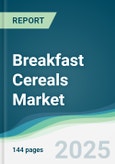The breakfast cereals market is a dynamic and competitive industry, characterized by a diverse range of products catering to varied consumer preferences globally. Cereals, typically made from grains like wheat, oats, and corn, are consumed with milk, yogurt, or fruit, offering convenience and versatility. The market is driven by evolving consumer lifestyles, growing health awareness, and the availability of numerous cereal options in various flavors, shapes, and sizes. Manufacturers continuously innovate to introduce new products with unique flavors and textures to meet consumer demands, while both major players and smaller companies contribute to the market's vibrancy by offering mainstream and niche products.
Market Growth Drivers
A key driver of the breakfast cereals market is the investment in research and development (R&D) by leading companies. These investments fuel innovation, enabling the launch of new and improved cereal products that align with consumer preferences for healthier and more convenient breakfast options. New product introductions create excitement, attract new customers, and retain existing ones, thereby boosting sales and driving revenue growth. This competitive dynamic fosters continuous innovation, as companies strive to differentiate themselves in a crowded market. The introduction of novel products not only enhances brand appeal but also expands distribution networks and customer bases, further propelling market growth.Geographical Outlook
North America holds a significant share of the global breakfast cereals market, driven by strong demand for convenient and nutrient-rich breakfast options. In the United States, cereals are particularly popular among consumers with busy lifestyles who value quick and easy meal solutions. The growing health consciousness among consumers has further bolstered demand, as cereals are marketed as a nutritious option providing essential nutrients and energy with minimal preparation time. The availability of a wide range of cereal products with diverse flavors and nutritional benefits enhances their appeal, particularly for health-focused consumers seeking convenient breakfast choices.Competitive Landscape
The breakfast cereals market is highly competitive, with major players dominating the industry while smaller companies carve out niches with unique offerings. Companies are constantly seeking ways to stand out through product innovation, packaging, and marketing strategies that emphasize health benefits and convenience. The market's growth trajectory is supported by the increasing global demand for healthy, quick breakfast options and the expansion of cereal products into new regions. As consumer preferences continue to evolve, the introduction of innovative products remains critical for companies to maintain a competitive edge and drive sustained revenue growth.Future Outlook
The breakfast cereals market is poised for continued growth in the coming years, fueled by rising demand for convenient and healthy breakfast solutions, ongoing product innovation, and geographic market expansion. Companies that invest in R&D to develop products tailored to health-conscious consumers and leverage effective distribution strategies will likely see significant growth opportunities. The competitive nature of the market underscores the importance of innovation and adaptability in meeting consumer needs and sustaining market leadership.Key Benefits of this Report:
- Insightful Analysis: Gain detailed market insights covering major as well as emerging geographical regions, focusing on customer segments, government policies and socio-economic factors, consumer preferences, industry verticals, and other sub-segments.
- Competitive Landscape: Understand the strategic maneuvers employed by key players globally to understand possible market penetration with the correct strategy.
- Market Drivers & Future Trends: Explore the dynamic factors and pivotal market trends and how they will shape future market developments.
- Actionable Recommendations: Utilize the insights to exercise strategic decisions to uncover new business streams and revenues in a dynamic environment.
- Caters to a Wide Audience: Beneficial and cost-effective for startups, research institutions, consultants, SMEs, and large enterprises.
What do businesses use our reports for?
Industry and Market Insights, Opportunity Assessment, Product Demand Forecasting, Market Entry Strategy, Geographical Expansion, Capital Investment Decisions, Regulatory Framework & Implications, New Product Development, Competitive Intelligence.Report Coverage:
- Historical data from 2020 to 2024 & forecast data from 2025 to 2030
- Growth Opportunities, Challenges, Supply Chain Outlook, Regulatory Framework, and Trend Analysis
- Competitive Positioning, Strategies, and Market Share Analysis
- Revenue Growth and Forecast Assessment of segments and regions including countries
- Company Profiling: Strategies, Products, Financial Information, and Key Developments among others
Breakfast Cereals Market is segmented and analyzed as below:
By Type
- Hot cereals
- Ready-to-eat cereals
By Product
- Corn-based
- Wheat-based
- Rice-based
- Oat-based
- Multigrain
- Bran-based
- Others
By Distribution Channel
- Online
- Offline
By Geography
- North America
- South America
- Europe
- Middle East and Africa
- Asia Pacific
Table of Contents
Companies Mentioned
- General Mills
- Nestle S.A.
- Kellogg Company
- Dr. Oetker
- Freedom Foods Group
- Carman's Fine Foods
- Food for Life Baking Co. Inc.
- POST HOLDINGS, INC
- B&G Foods Inc.
Table Information
| Report Attribute | Details |
|---|---|
| No. of Pages | 144 |
| Published | August 2025 |
| Forecast Period | 2025 - 2030 |
| Estimated Market Value ( USD | $ 60.67 billion |
| Forecasted Market Value ( USD | $ 80.28 billion |
| Compound Annual Growth Rate | 5.7% |
| Regions Covered | Global |
| No. of Companies Mentioned | 9 |









